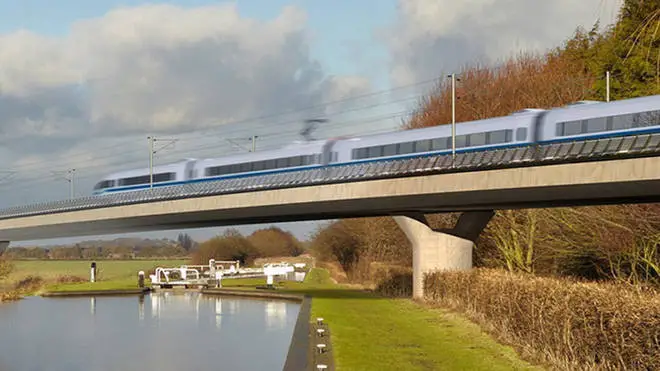
Ali Miraj 1pm - 4pm
11 February 2020, 12:46

Boris Johnson has given the green light for the controversial HS2 project to go ahead, in a move which could cause splits in the Tory party.
The Prime Minister referred to HS2 as the "spine" of the transport network as he made his announcement in the Commons.
He told the House of Commons that his Government had the "guts to take the decision" to deliver prosperity across the country.
Concerns have been raised by Conservative Party politicians over the costs of the project and worries over potential damage to the environment.
Opposition parties have hit out at the move with Labour saying HS2 has been "appallingly mismanaged" by the Tories.
Mr Johnson has given the all clear for Phase 1 of the project between London and Birmingham, but has said more time is needed to assess the next phase which would connect further north to Manchester and Leeds.
The move means high-speed trains can also run further than the new lines, using existing tracks as far as Edinburgh and Glasgow.
Tory MPs in seats along the route south of Birmingham are among those who are angry over HS2's cost and impact on the environment.
Speaking to LBC Radio, Transport Secretary Grant Shapps described it as "maybe the biggest infrastructure project, certainly in Europe, and the biggest this country's ever taken, certainly in peacetime."
HS2 critic and Lichfield MP Michael Fabricant described the expected announcement as "very disappointing" and warned HS2 will cause "immense" damage to the countryside.
The Tory benches erupted into shouts of "No" when Mr Johnson was asked if he agreed that HS2 should go ahead during Prime Minister's Questions last month.
Mr Johnson's most senior adviser, Dominic Cummings, is said to be in favour of scrapping the scheme.
HS2 Ltd - the Government-owned company responsible for developing and building the railway - says it will boost capacity and cut journey times.
Several environmental organisations claim building it will cause huge damage to natural habitats, including dozens of ancient woodlands.
Communities living on or near the route have expressed anger at the impact on their lives, while many people have said the project is simply too expensive and the money would be better spent elsewhere.
Rail, Maritime and Transport union general secretary Mick Cash said: "This Government has dithered over this decision for far too long, which has meant uncertainty and delays to this vital rail project.
"Now that they are on the point of giving the go-ahead, the Government and HS2 must take steps to ensure that jobs on the project are directly-employed, with union agreements, a safe workplace, and without the scourge of blacklisting.
"While we await the details of the full package it is essential that the Government guarantees that the northern route of HS2 is not downgraded and commit to investing in an affordable, accessible and publicly-owned railway fit for the 21st century."
Labour's shadow transport secretary Andy McDonald claimed HS2 has been "appallingly mismanaged" by the Conservatives Party.
He called for the high-speed railway to be integrated with Crossrail for the North - a proposed boost for rail services between Liverpool and Hull - and eventually extend high-speed lines to Scotland to "remove the need for domestic flights".
The Lib Dems acting leader Ed Davey said HS2 alone wouldn't "unite the country."
He said: “There are huge questions about how the Conservatives have mis-managed HS2 so badly, but the climate case for expanding Britain’s railways remains a strong one.
“Yet HS2 alone won’t unite the country, bring economic benefits to the Midlands and North or cut the demand for domestic flights to help our climate unless it’s part of a bolder rail revolution.
“Above all, we must improve railway links east to west, with train lines that don’t always have London as their destination."
HS2 is modelled on its predecessor HS1, that links London to the Channel Tunnel.
Once completed, it will link London to cities in the West Midlands and in the North and cut journey times between the capital and Birmingham by 28 minutes, travelling at speeds of up to 250mph.
Current designs involve a second Y-shaped phase launching in two stages: Phase 2a from the West Midlands to Crewe followed by Phase 2b from Crewe to Manchester, and Birmingham to Leeds.